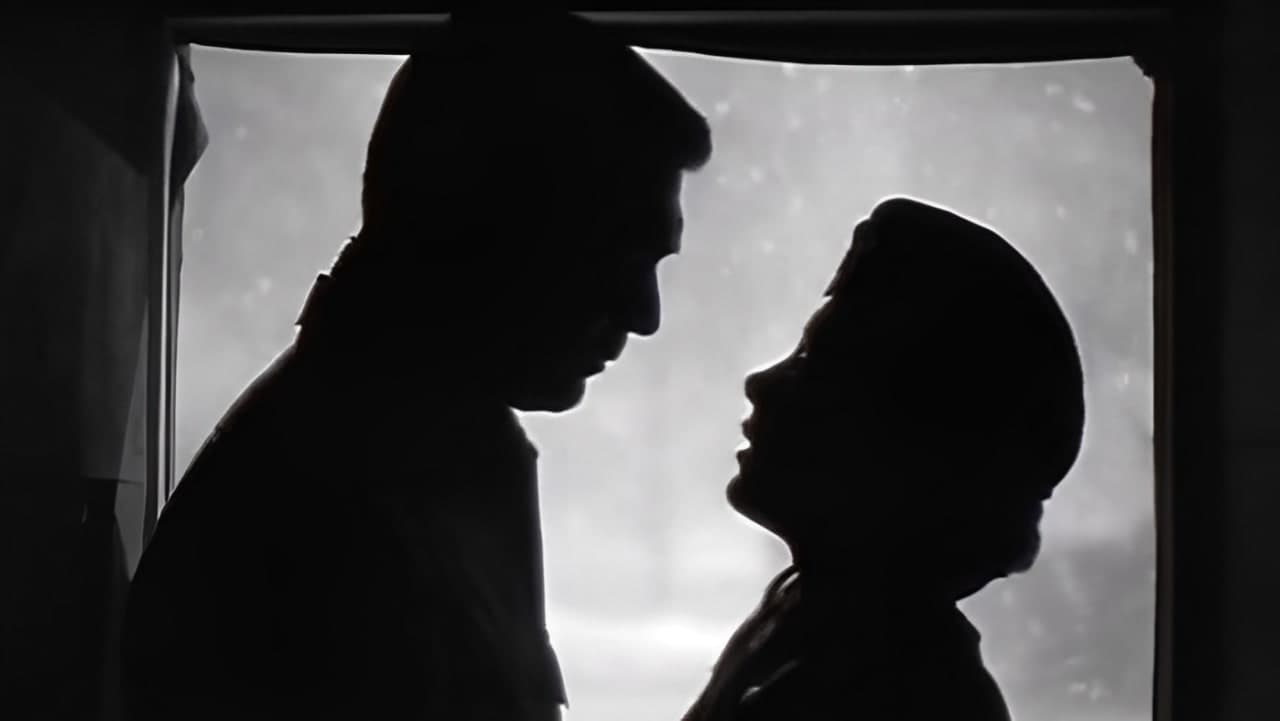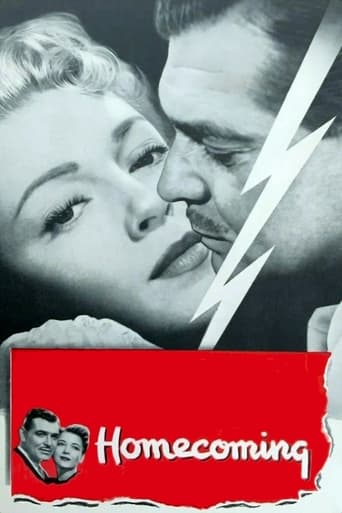

The advantages and disadvantages of television's bill of divorcement from history and chronology are very evident on a recent viewing of Homecoming. It doesn't matter much anymore that the film re-unites Gable and Turner who literally set the screen afire on their previous outing, "Somewhere III Find You", six years earlier. The romance is strong, but much more muted. Turner doesn't come on for at least half-an-hour and it's an equal length of time after that before the first silhouetted embrace. All that doesn't matter any more. Nor is it worth knowing that contemporary critics poured scorn on the movie, whereas the public loved it. What we have now is only the movie itself - divorced from history, from all the cries of studio publicity, from the derision of contemporary reviewers, and even from the word-of-mouth of acquaintances and friends.Actually, the film stands up rather well. True, the story is as artificially ' contrived as they come, but I found it both moving and engrossing - despite the feeling that it is scripted and directed with occasional too-obvious clumsiness and heavy-handedness. Gable is excellent - a strongly charismatic personality, playing with conviction and sincerity. Turner - in what is undoubtedly her least glamorous role - plays with unusual naturalness and professionalism. It is probably the most convincing performance of her career. The character is well-written. By contrast, Baxter seems artificial and too sweet. Hodiak makes the most of his big scene with Gable early in the film (effectively shot all in one take), but thereafter - like most of the support players who exist merely to provide cues and background - has little to do.All in all, "Homecoming" is big-budget screen entertainment - directed and produced with considerable style and expertise - that wears rather well, thanks to the magnetism of its stars, the appositeness of its dialogue and the realities of its plot.
... View MoreTwo years after her steamy portrayal in "The Postman Always Rings Twice", Lana Turner plays a military nurse against the backdrop of WWII. And that is about all the war is in this film. As the Battle of the Bulge batters the distant, fiery horizon, Turner and Clark Gable share their first kiss. He is a doctor assigned to the same medical evac unit.This film seems little more than a soap opera. But it feels rather choppy. As a result, the relationship between the characters is not as developed as it should be.Athe title suggests, the film is really about the strains that distance but on a relationship. And about the hardship of being the one left behind. That is one thing this film conveyed well. Gable's wife is always the focus of the film even when she is far away from the storyline. We know what she has promised, what she has sacrificed. It would be the cruelest blow to be rewarded with desertion.In reality, this is one of many scenarios where homecoming can be a sad reunion. The film reminds us of this, even if it is, on the whole, not as memorable as the cast deserves.
... View MoreAs a rule I'm not much into romantic films, but there are exceptions and Homecoming is one of them. Clark Gable and Lana Turner did four films together and this is the third one. It's Turner's show here. It's a great tribute to her charisma and star quality that she looks incredibly sexy in those army fatigues she has to wear as per the plot. Lana Turner in heryounger days had a quality of winsomeness that was never showcased than when she plays Jane "Snapshot" McCall, idealistic army nurse.In this cynical age we would look with incredulity that a widow with a young son would follow her late husband off to war because his ideals became her ideals. Yet Turner makes you believe that in this film.The plot is simply Clark Gable, very successful doctor in a small mid-west city, goes to World War II basically because its expected of him. He's a self centered guy, nice home, loving wife played very well by Anne Baxter, all the material things you could want and not a clue about why we are in World War II. He has a fellow physician friend, John Hodiak who does a lot of pro bono public service work who tries to act as a conscience, but fails. I guess Turner had something to offer Hodiak didn't. At first Dr. Ulysses Johnson (Gable) and Nurse McCall don't hit it off after she's assigned to him as a nurse. But her beauty and idealism get to him he falls for her big time. Because its 1948 Hollywood and Anne Baxter is by no means a bad person there was no way Turner was going to wind up with Gable in the end. She has to die, but Turner is given a death scene that is one of the most moving in the history of film. You have to be made of stone not to be touched by her and Gable at her bedside.John Hodiak, a very talented and almost forgotten figure today is also terrific as Gable's friend Dr. Robert Sunday. Gable will be working with Hodiak at the clinic Hodiak has in a poor neighborhood and he will be doing it because of the social conscience Turner has instilled in him. There are no bad people in this film except the Nazis shooting at Gable Turner and the rest of Eisenhower's army.I believe this is Lana Turner's best film and fans of her's should not miss this one.
... View MoreThis is a very enjoyable piece of film making. Lana Turner and Clark Gable work well together in this likeable World War 2 light drama. A must for both Lana and Clark fans. Not a brilliant piece but again enjoyable.
... View More